Ripple Effect’s impact in Western Kenya, 2017-2020

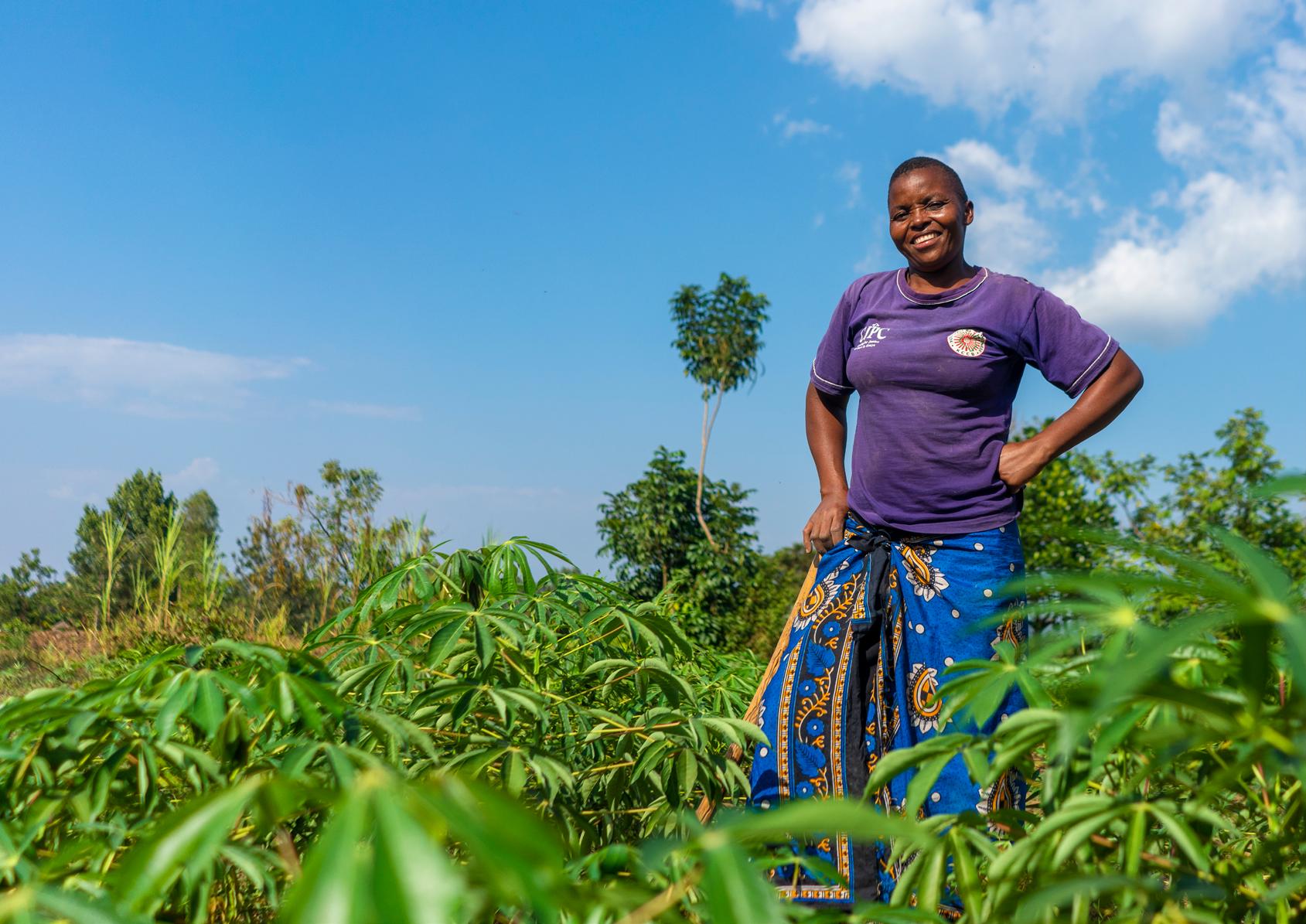
“Develop, arise, and plan for a good life!”
Caroline
This report contains hyperlinks to bespoke videos and podcasts.
For best performance, please download this PDF then view it in a PDF reader such as Acrobat.
Please note this media was produced before Ripple Effect became the new name for Send a Cow.
These are the powerful words of Caroline, one of the farmers we work alongside. Her story (click here to read it) encapsulates everything we strive to do: to work holistically with communities to support them to improve their social and economic wellbeing. In the past three years we’ve pooled our resources, knowledge, patience and perseverance with that of communities across Western Kenya and supported their improvement in day-to-day life.
When we asked Caroline which three words she’d use to describe our work, she said “develop, arise, and plan for a good life”. This presents in a nutshell how we work – from the training we provide, to the hoped-for rise in wellbeing, to the ability for families to feel more secure and plan their future.
This report presents what we have achieved together: a priceless rise in people’s level of hope and confidence, a tangible rise in income, access to resources, and a hard-won drop in the incidence of violence against women.
Our work to support farming families over the past three years has brought concrete change. In the face of climate change and the COVID-19 pandemic, we’ve worked alongside farmers – men and women – to improve their income, nutrition, access to safe water and sanitation. Women farmers have seen change thanks to our investment in, and their commitment to, changing mindsets and norms that inhibit their lives.
After three years, we are proud to report for example that in one key programme in Western Kenya –Improving Nutrition in the Busia and Bungoma Counties, we have seen a 7-fold increase in the daily income of project participants.
It is very difficult to put a monetary value or measure on change. That is why we have developed the Social Return on Investment tool (SROI) to put a value on the social, environmental as well as economic changes generated through a project. This uses proxy indicators where financial values are absent.
In calculating the SROI for the Improving Nutrition project, we were able to report a £9.84 return for each £1 invested.

Figures aside, it is structural changes in people’s beliefs and practices that unlock potential and improve livelihoods. Over the past three years we have seen this happen in particular among the women in the households we work alongside, be it a rise in income or a drop in domestic violence.
Our thanks go to the farmers for believing in Ripple Effect, and in doing so, enabling themselves. Thank you also to our supporters and donors, in particular UK Aid, the Allan Willett Foundation and Stanbic Bank for sponsoring this publication. We invite you to read on to find out more.
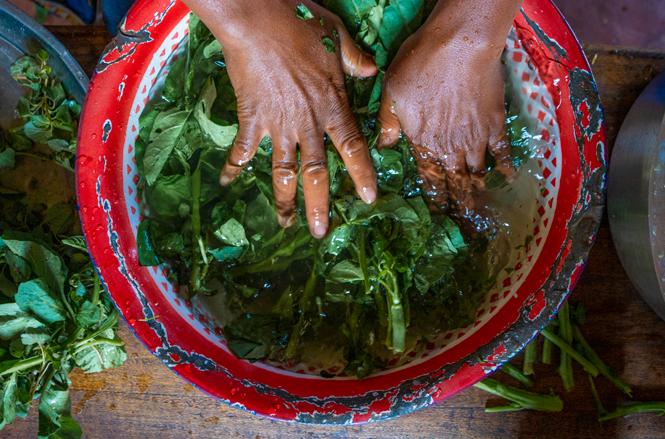 Titus Sagala Country Director
Titus Sagala Country Director
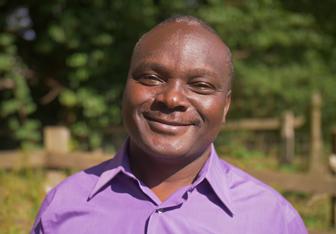
2
“
If I had partnered with Ripple Effect earlier, I would not have wasted 15 years of my life.
1. A community approach: passing on the gift of knowledge
Through self-help groups and Peer Farmer Trainers, Community Health Volunteers, and sometimes neighbours encouraging other neighbours, our work has brought together thousands of people in farming communities in Western Kenya to maximise their resources and secure their livelihoods.
Self-help groups have always been at the core of our way of working. We deliberately target the disadvantaged or marginalised within the community to become members of our self-help groups. These receive an intensive training programme. However, we also know other community members will benefit from components of this full training programme, so we are continuously evolving and working on ways to ensure other community members also can access targeted interventions that will benefit them as well.
of families are more food secure
fewer people are using untreated water were not lacking in toilet facilities by project end
Over the past three years our work with self-help groups has seen dramatic improvements in people’s nutrition, financial security, social inclusion and sense of hope and satisfaction. Progress has even been made in access to good hygiene and sanitation, where standards were already relatively high. In Busia and Bungoma Counties, 98% of households became food secure, with 87% consuming more than six types of foods a day compared to under three types at the start of the programme. Access to toilet facilities also improved, with the proportion of households lacking toilet facilities falling from 8% to just 0.5%.
TRAINING PEER FARMERS TO TRAIN OTHERS
These significant improvements are the result of two things – working with farming families to improve their knowledge and skills, and another important ingredient: community willingness to learn how to improve health, nutrition and farming practices, and to “pass on the gift” of their training and knowledge to benefit others.
For example, our farm systems training in Kakrao has supported farmers to learn key practical skills from our invaluable network of 30 volunteer Peer Farmer Trainers who have a deep urge to help other self-help group members succeed.
Volunteer Peer Farmer Trainers are selected for their ability to host other group members on their farms, their literacy skills, and their passion to pass on what they have learned. Peer Farmers are trained to map resources, think systematically about their agriculture, and to understand soil and water conservation, pest and disease management, and integrated livestock management. They are assigned their own groups and are closely monitored and mentored by Send a Cow, with monthly planning meetings and quarterly reviews.
In Busia and Bungoma, 46 Peer Farmer Trainers brought change to their communities by providing on-farm training on natural
resource management and water access. Other community initiatives included tree nurseries, health education days for local families, and outreach on topics such as agriculture, nutrition and health care through radio talk shows.
COMMUNITY HEALTH VOLUNTEERS REDUCE USE OF UNSAFE WATER
In Kakrao, our team of 15 Community Health Volunteers –drawn from the local community – have enabled farming families to understand the importance of treating drinking water to reduce cases of illness. Together, the Community Health Volunteers have almost halved the proportion of people not treating their water before using it (from 25% to 13%) over the past three years.
Play a short video summary of this chapter






Placeholder text click through to an audio file
Placeholder text click through to view a video file Play mini podcast ‘A Community Approach’.

3
Community lies at the heart of our work.
Case study: From subsistence to surplus: Anne’s story
Like many smallholder farmers in Kenya, erratic rainfall, poor soil fertility and inadequate access to quality farm inputs and technologies, finance and markets trapped 54-yearold Anne and her family in a vicious cycle of poverty. “For many years I mainly practiced monoculture farming, crowding my farm with maize crop only. In the beginning, this practice worked well but over time it became detrimental to our food security and livelihood,” she says.
In 2018, Ripple Effect’s Improving Nutrition and Livelihoods for Children and Mothers (INLCM) programme started to support local farmers to improve agricultural practices and nutrition through field days, on-farm demos, exchange
visits, media campaigns and the support of Peer Farmer Trainers. Farmers were introduced to crop diversification, seed and variety selection, soil management, use of organic fertilizers, irrigation practices, organic pest and disease management, harvesting and postharvest handling, animal health, milking hygiene, animal nutrition and animal welfare.
Anne and her family now cultivate African leafy vegetables, pumpkins, maize, bananas, pawpaw, pineapples, avocados, sweet potatoes and drought-tolerant crops like cassava. She also breeds poultry for meat and eggs and is rearing a dairy cow.
Through the training, the way Anne sees her farm plot has changed. “I immediately put into practice what I was taught. I divided my farm into plots and built irrigation trenches.
I also applied compost manure to improve soil fertility and planted a diverse variety of crops, vegetables and fruits. I am now farming as a business.”
Anne says that other farmers from her local community are learning from her, and she attributes her success to Ripple Effect training. “I was very poor and food insecure. I could hardly afford to provide my family with basic needs such as clothing and education. We used to struggle to have two meals in a day and having a balanced diet was a luxury we could not afford. But all that has now changed. My family can now easily afford four nutritious meals in a day and I can now comfortably and sustainably provide my family with the basic needs they require.”
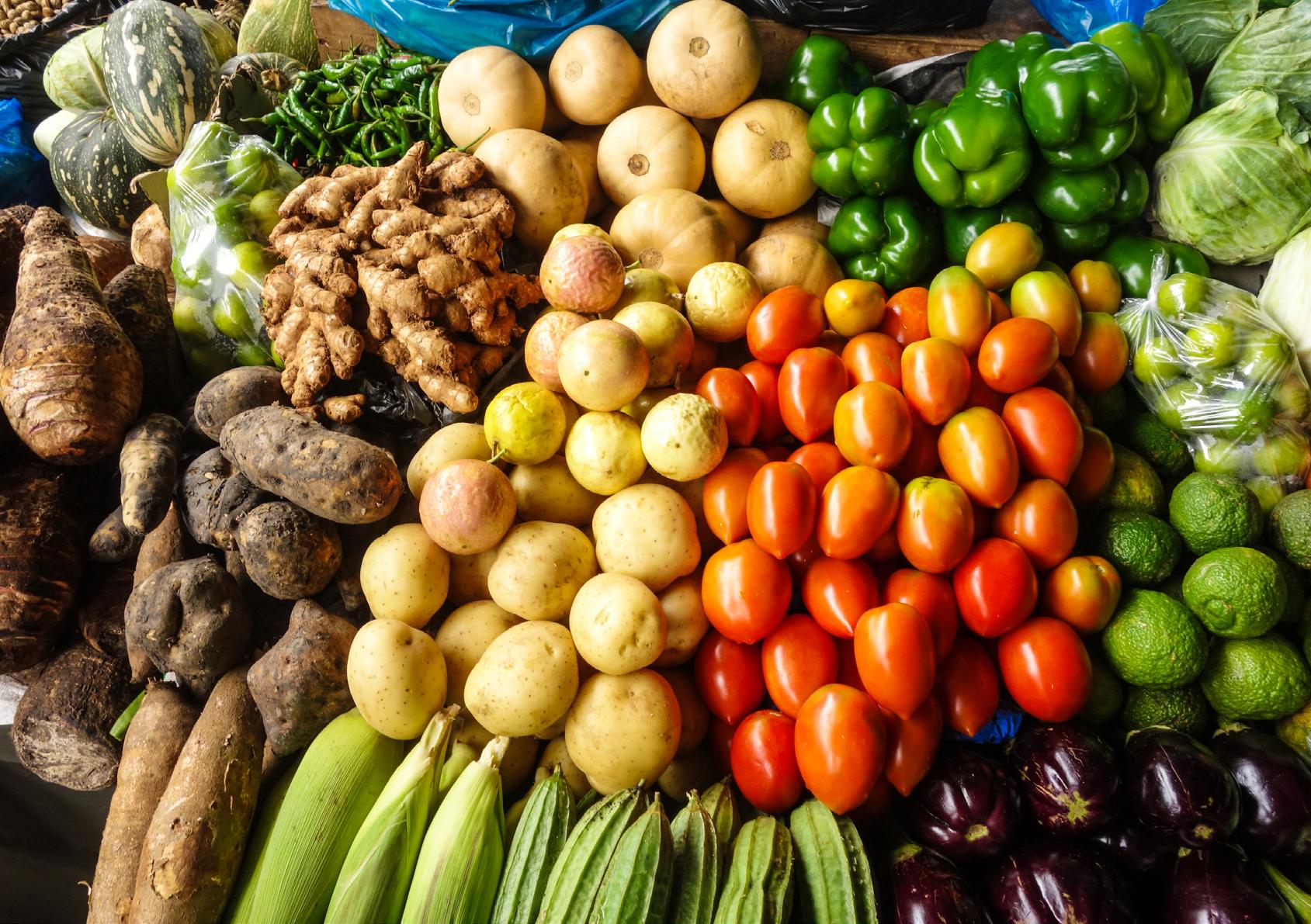
4
2. Changing minds, breaking down barriers
Attitudes and beliefs can be powerful. They can stop people reaching their potential and can sometimes cost lives. Ripple Effect’s work with communities on issues such as gender equality and domestic violence, disability, health insurance, nutrition, employment, and HIV and AIDS has enabled people to start their life anew.
LEVELLING UP ON GENDER EQUALITY, INCOME & DISABILITY INCLUSION
Over the past three years, Ripple Effect’s work has led to both women and men broadening their understanding of unequal gender roles, agreeing to share responsibilities in the home and the community, and developing a shared vision for their families’ futures.
Since the Improving Nutrition project began, in some areas 84% of women are now fully involved in making minor decisions (an improvement of 20%), while the number of women making major decisions has improved significantly from 23% to 84%.
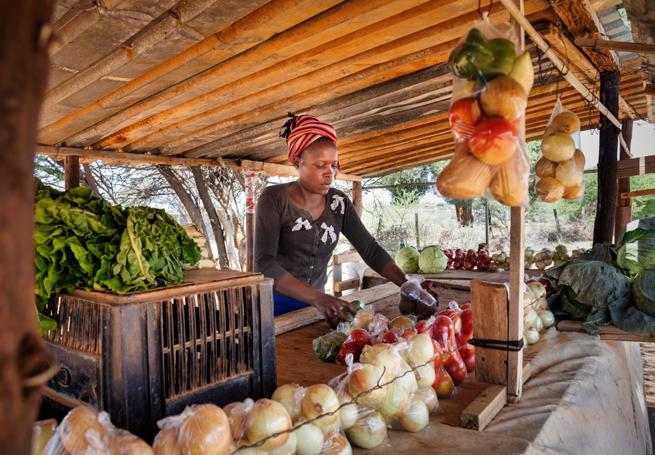
Cluster Committees (against a target of 30%).
The Kakrao Sustainable Livelihoods project – which has reached 3,203 households – has also promoted sustainable, inclusive and productive work opportunities for women and young people, helping them earn a decent income (see case study). Ripple Effect, in partnership with national government, local NGOs and the Kakrao Ward community, has supported marginalised farmers, including those with a disability, to develop enterprises and to market and sell their produce for the best possible price.
Before the inception of the project women used to do all the work, including working in the farms. Men used to feel superior to the women and they did not consult with the women on many issues such as land use. Land use was perceived as a man’s game.
Women’s influence over community level decisions in Busia and Bungoma Counties has also increased, with 91% of leadership positions at group level now being held by women (against a target of 70%) and 80% in
“
5
– Victor Otulo, Koyoo Farmers Group
Continued overleaf
more women are now making decisions in the home thanks to our testing and support services
HIV has been supressed by of households are now registered for health insurance
ERADICATING ATTITUDES THAT FUEL VIOLENCE AGAINST WOMEN AND GIRLS
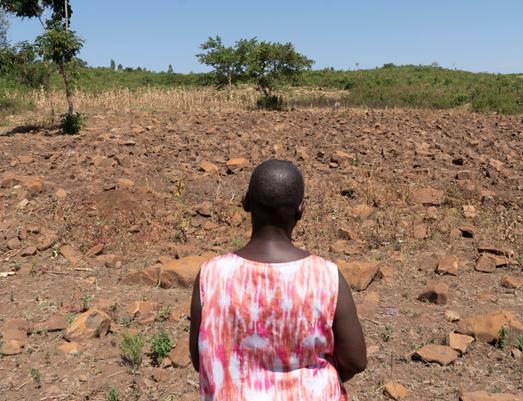
Our SVRI*-funded research, conducted in partnership with the Global Women’s Institute of George Washington University, indicated that many women believed men had authority over them and therefore accepted violence at the hands of their partners. The study found that Ripple Effect’s integrated approach to improving family finances and gender dynamics can help to reduce intimate partner violence.
Through this research project, Ripple Effect has learnt that dealing with the underlying attitudes and beliefs that cause such violence must be a crucial part of our gender and social inclusion training. Supporting our staff to understand the causes of intimate partner violence has made them more aware of it in the community and future training for
project participants will not only aim to change unequal gender dynamics but will also focus on transforming the social norms that perpetuate the power imbalances that result in violence.
TACKLING HIV & AIDS AND THE STIGMA THAT SURROUNDS IT
HIV prevalence in Migori County, where the Kakrao Sustainable Livelihoods project took place, is 14.4%, well above the national average of 4.2%. This is partly the result of a lack of knowledge about HIV transmission, partly the result of poverty, as young girls turn to sex work and young men head into local towns to find work, and partly due to harmful cultural beliefs and practices.
To tackle the virus, 97% of households taking part in the Kakrao Sustainable Livelihoods project have been tested for HIV & AIDS, and 91% of these households have benefitted
from a range of HIV & AIDS care and support services, including testing, access to anti-retrovirals, referrals to more specialist care, support to address stigma through support groups, and nutrition. The support groups, each with 15-20 members, have reduced stigmatization, improved adherence to taking medication, linked clients to health facilities, and followed up on those not adhering to their medication – all of which has led to viral suppression of over 95%. In addition, some Peer Farmer Trainers and Community Health Volunteers are themselves HIV-positive and can thereby use their influence to change people’s attitudes.





Play a short video summary of this chapter
Play mini podcast ‘Changing Minds’.

6
*Sexual Violence Research Institute
“ Thank you, Ripple Effect, for opening my eyes to unlock my potential.
Case study: Young people mean business: Stephen Shikuku’s story
“Go to town and look for employment opportunities because you do not have any experience in farming.”
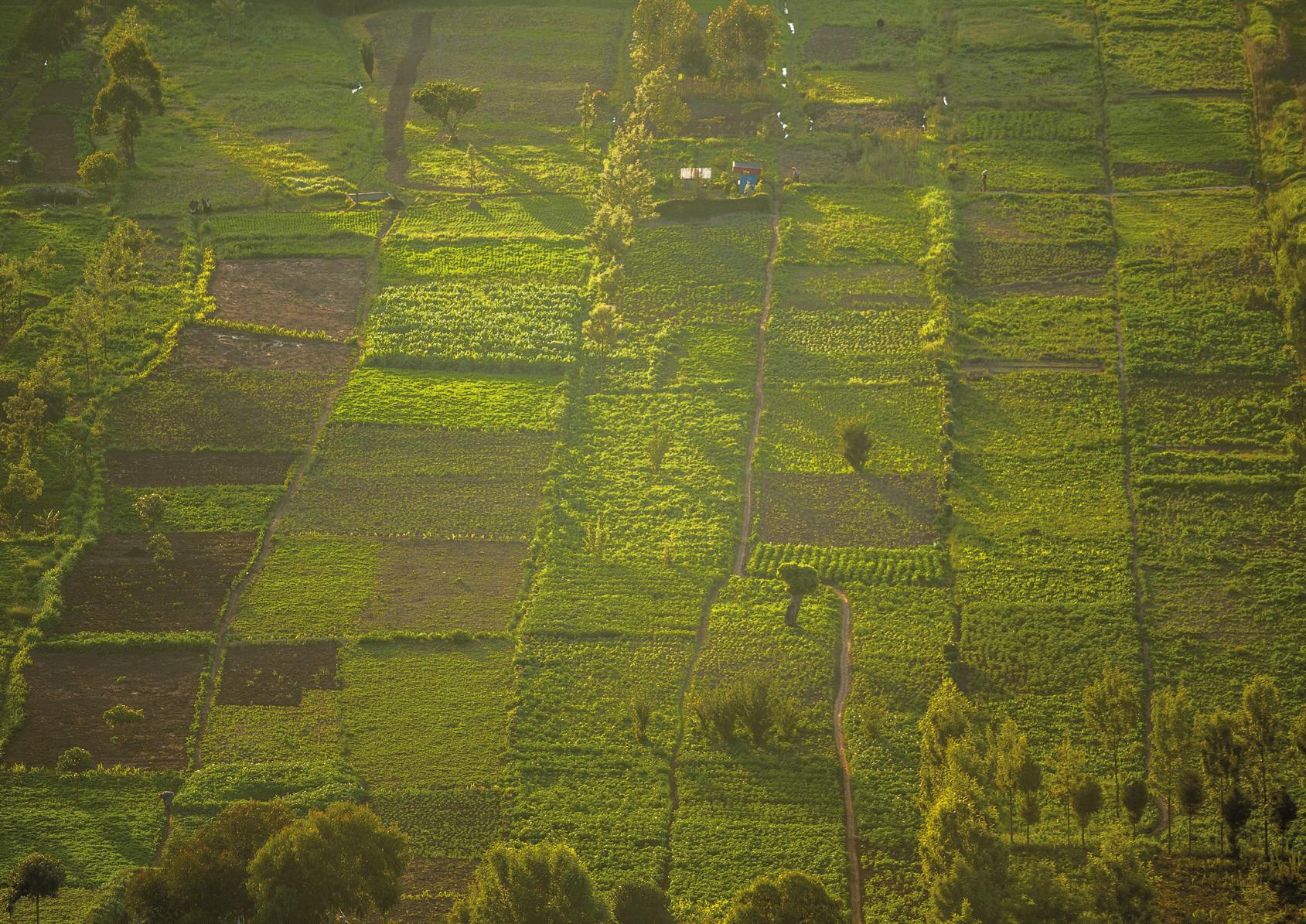
That was the advice of Stephen Shikuku’s farmer parents when he graduated. But Stephen was not ready to quit. As a member of Evolva Youth Group, he started engaging other members to improve their skills in farming.
In 2018, the group partnered with Ripple Effect in Angorom, Busia County. The 22 members took part in training on agricultural practices, business development skills, record keeping and farm planning. After applying his training, Stephen’s first harvest of African leafy vegetables earned him KSh 40,000 (£263).
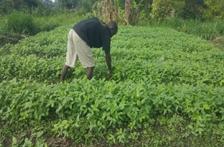
Becoming a supplier to the local hospital and university led him to register the trade name Great View Farm Enterprises in 2019. To enhance Stephen’s confidence and increase productivity and sustainability, Ripple Effect provided three dairy goats, 200 banana seedlings and 50 papaya seedlings to him and other group
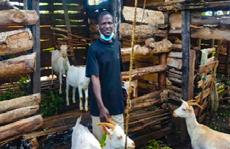
members.
Today, Stephen is an example to other young people in his village that agribusiness works. As one of the main suppliers to Alupe University, he says: “On average I earn KSh 40,000 per month from my farm. I am a full-time farmer, and this is business. I [now] buy from other farmers to meet the orders from the university.”
Stephen has constructed a house for himself, bought a heifer, and expanded his poultry project. His parents now have much confidence in him and have given him an extra two acres of land to expand. “Thank you, Ripple Effect, for opening my eyes to unlock my
7
3. Women and families: eradicating violence, finding a voice
Gender equality and women’s empowerment are two sides of the same coin, and both are central to Ripple Effect’s work. Women’s standing in their families and communities is boosted when they become owners of livestock, and when neighbours and friends seek out their new skills and experience. Our work to empower women economically has successfully challenged unequal gender norms, which has in turn more than halved the rate of intimate partner violence (IPV) in some locations.
Our work in Western Kenya has focused on nutrition, food security, better health and sustainable livelihoods to reduce the social and economic stresses faced by families, as well as promoting more equal household dynamics – as families can more easily prosper if there is greater harmony in the home.
WOMEN EXPERIENCE A POSITIVE CHANGE IN THEIR LIVES
WOMEN HAVE MORE SAY AND MORE RESPECT
In Kakrao, women’s power to decide which crops to grow has risen, with 99% of directly reached women (and 79% of indirectly reached women) making some, most, or all decisions about crops. Importantly, this change has lasted: data shows that the impact was sustained or improved after one year of project intervention.
Domestic violence has fallen by
of women are making some or all decisions about which crops to grow
Emotional and sexual violence has fallen by
The empowerment of women was a key component of this project. They can decide what to plant in their farms for food security and nutrition, they can decide what to cook and they can make decisions around how to use the family income.” Jane, County Agricultural Officer, Kimaeti
More than 60% of women participating in the Improving Nutrition project in Busia and Bungoma said that domestic violence either decreased or stopped after working with Ripple Effect. The most significant change related to physical violence, which had decreased for 32% of women surveyed, and had stopped altogether for a further 36% (in total, 68%). Similarly, more than 60% said that emotional and sexual violence had either decreased or stopped. Improved food availability, access to more varied diets and increased household income have reduced stresses which often trigger cases of gender-based violence.
The farm systems training has also boosted the recognition given to the role of the women in increasing the incomes of families, while the training in gender equality has enabled the women of the family to have more influence and control over decisions about the use of household resources and income generated from the farm.
Play a short video summary of this chapter





Play mini podcast ‘Working with Women’

8
“
“Improving gender roles in households is a challenge in our work, as we face deeprooted norms and beliefs that contribute to gender imbalances,” says Sylvia.
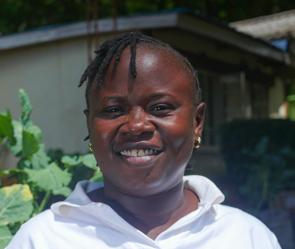
“People have been socialised to accept these norms and feel nothing has to change.”
Discriminatory gender norms have been around for generations, and Ripple Effect knows it takes time and investment to unlearn
them. “Being constantly present in community and household dialogues on gender imbalance has seen some of the households we work with experience a complete transformation on gender roles,” says Sylvia. “The most significant shift has been empowering women in decision-making, and in their being able to acquire and own resources like livestock (cow, goats and sheep) in places where ownership of such resources is predominantly for men.”
Our work on gender equality has also raised people’s confidence to be able to speak in public and get involved in community activities they were excluded from before because of low self-esteem or discrimination. “Anecdotally we know that economic empowerment enhances the position of women and other excluded groups in
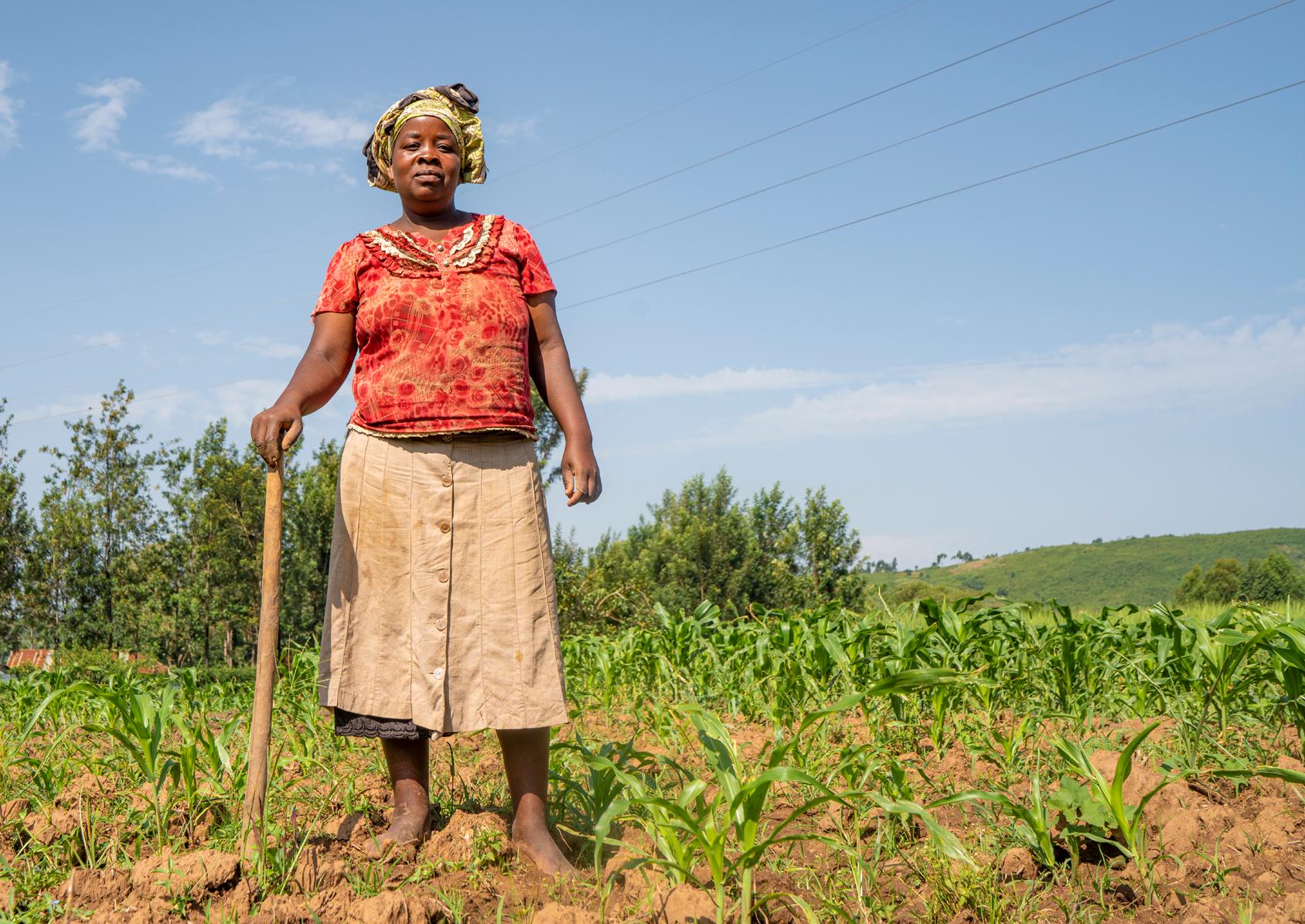
the community,” says Sylvia. “Therefore, sustaining our gains on gender equality and inclusion means building livelihoods that are resilient to shocks.”
Information and education are also important in changing attitudes that perpetuate social imbalance.
“Building the capacity of Peer Farmer Trainers and Community Health Volunteers permanently located in these communities to disseminate key information can ensure that the changes we’ve won in terms of gender and social inclusion are maintained.
“It’s critical to keep supporting this work because issues of gender and mindset are a product of socialisation intertwined with culture, and unlearning culture is a gradual process that cannot be achieved by deadline.”
9
Staff interview: Investing in women’s empowerment: Sylvia Owino, Project Coordinator and Gender and Social Inclusion Coordinator
4. Strengthening farm management: the key to food and nutrition security
Thousands of farming families in Western Kenya are prospering with Ripple Effect’s support. Together, our work to promote effective farm systems and well-managed resources has boosted the region’s low agricultural productivity, improved nutrition and helped mitigate some of the effects of climate change.
Awareness of new farming technologies has risen
of communities have adopted composting of households now carry out more than four income-generating activities
When our Kakrao programme began in 2017, continuous tobacco cropping had depleted the land of nutrients and many farmers had cut down trees to grow it –contributing to climate change and soil erosion. There was little knowledge of climate-sensitive water conservation technologies, such as irrigation. To combat this, we supported agricultural households to implement regenerative, lowinput farming methods, which also improved their crop and milk yields.
GROWING AWARENESS OF NEW FARMING TECHNIQUES
At the end of our three-year programme, awareness of farming technologies such as irrigation, crop rotation, intercropping, livestock housing, and better animal feeding practices had improved by an astonishing 69%, with crop rotation being the most known technology. Access to finance and exposure learning visits encouraged families to put their knowledge into practice in the most efficient ways. When it came to improved natural resource management, activities such as composting, soil conservation, soil erosion control were being practised by up to 98% of farmers reached.
“The project focused on increasing agricultural production through building farmer capacity, irrigation and resource-efficient agricultural techniques. As a result, farmers became food secure, were able to rear chickens, cultivate bananas and pawpaw, and sell surplus food to the market.
GENERATING INCOME THROUGH LIVESTOCK AND CROPS
And in Busia and Bungoma Counties, Ripple Effect’s investment of livestock and plants (including 234 heifers, 120 goats, 9,100 banana suckers, African leafy vegetables seeds and papaya seedlings) stimulated surplus production of nutritious food and animal products that could be sold. In both counties, over 80% households reached adopted more than four incomegenerating activities, including establishing fruit tree nurseries.
ESTABLISHING CLIMATERESILIENT AGRICULTURE
We also explicitly addressed climate change by promoting sustainable farming practices that work with nature. The promotion of irrigation made it possible for families to harvest crops off season, which in turn enabled them to earn income and access food all-year round. The establishment of tree nurseries is improving forest cover. This
activity is part of Ripple Effect’s vision of going beyond achieving net zero carbon emissions and creating a positive environmental benefit by removing significantly more carbon than is generated through our interventions.
Play a short video summary of this chapter




Play mini podcast ‘Farm Systems and Management’


10
Consolatah Atieno, Koyoo Farmers Group
Case study: Taking care of business: Sussy’s story
Sussy is Chair of a self-help group in Agolot, Western Kenya. When the group partnered with Ripple Effect in 2018, group members were trained on improved agricultural techniques such as intercropping, crop rotation, integrated animal management, agroforestry, nutrition, environmental hygiene and orchard establishment.
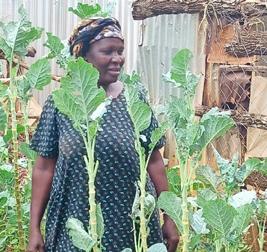
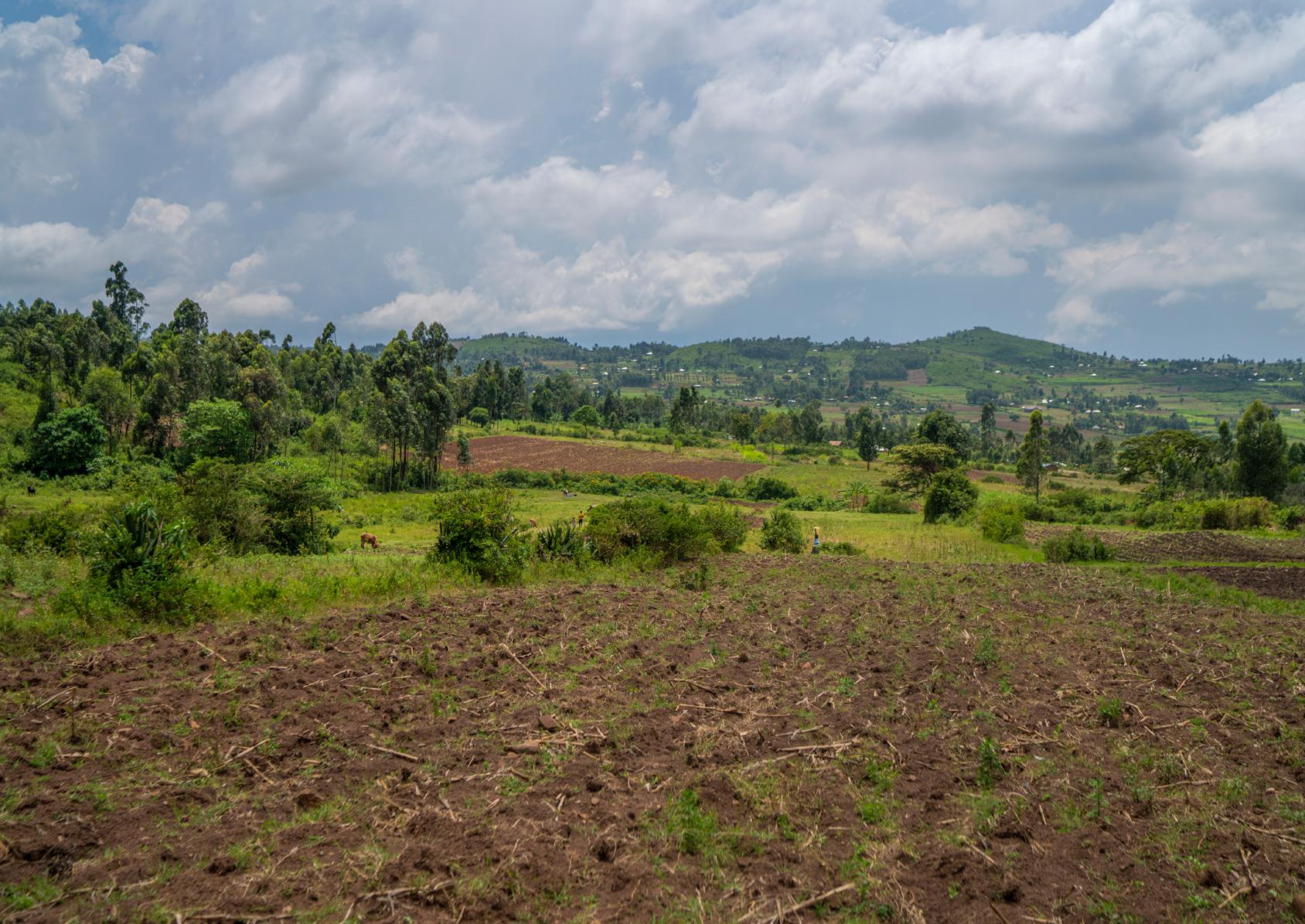
“As a Chairperson it was mandatory that I practise the technologies as a role model and that is when my life started changing,” says Sussy. “I later received a training on enterprise diversification, savings and record keeping, and through training and monitoring … I was amazed at how much money I got from the sale of vegetables, fodder and poultry.”
“I am happy that I can take my children to school and access affordable health care through community-based health finance. My vision is to scale up poultry production to 5,000 birds and increase my savings from KSh 1,000 (£6.60) to KSh 5,000 (£32.90).”
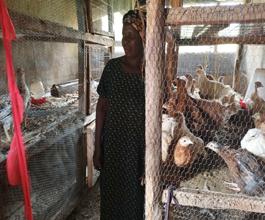
Sussy tending to her 100 chicks in a brooder
Sussy in her garden Sussy in her poultry house
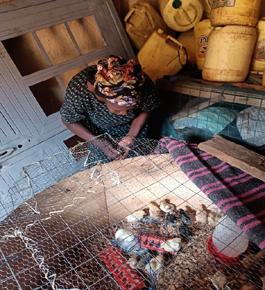
11
5. Food and nutrition: good food
Over the past three years, Ripple Effect’s work in Western Kenya has seen household dietary diversity more than double in some communities. Almost all households reached (around 98%) attribute this growing diversity to increases in their own-food production, which itself has been accelerated by Ripple Effectsupported access to specialized training, farm inputs, and adoption of farming system technologies.
FOOD SECURITY AND DIVERSITY ARE IMPROVING
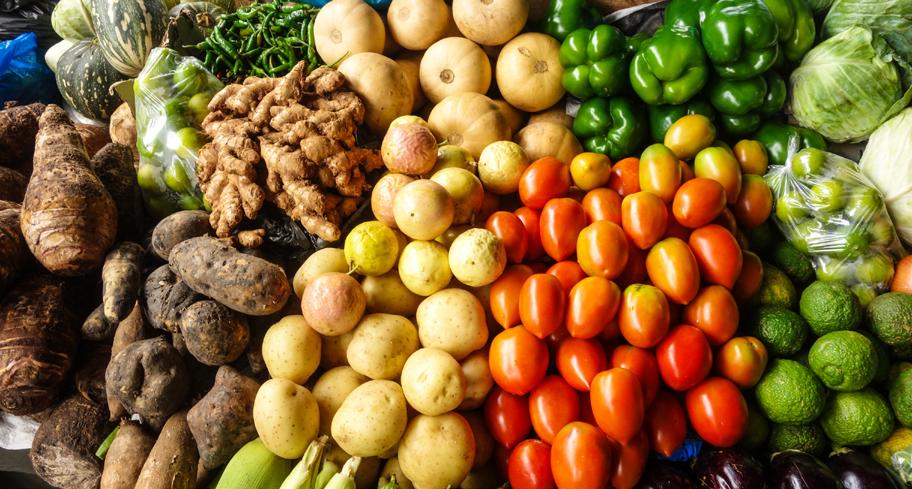
In Kakrao, 94% of farming families are now confident that their farms can meet their food and income requirements. They attribute this to new climatesensitive technologies, access to planting materials and training. Today, 98% of households in the programme rely on home-grown produce as the major source of food for their households, with only 1.3% buying food from the market. For 9 out of 10 people reached by the programme, the number of meals per day has risen from 2.5 to 3.
TRAINING AND OUTREACH IMPROVE EATING HABITS
Training by Peer Farmer Trainers and Community Health Volunteers, and information-sharing through radio talk shows, road shows, innovation platforms and nutrition open days have helped change nutrition and eating habits among households. For example, in Busia and Bungoma, the proportion of households in Ripple Effect’s nutrition support groups eating dairy products 2–3 times a week has risen from 18% to 85%, while those eating vegetables 3-4 times a week has risen from 21% to 94%. Those serving proteins 2–3 per week saw an incredible rise, from 13% to 81%.
In Busia and Bungoma, 98.2% households are now food secure, compared to 6% at the start of the programme. This has been achieved through increased yields resulting from newly adopted farming technologies promoted by Ripple Effect. Households report better access to more nutritious foods from their farms, and the capacity to buy food to supplement what they can grow.
Play a short video summary of this chapter
Play mini podcast ‘Nutrition in the Household’
12
is more readily available
Confidence in meeting household requirements has risen
of households now grow all their own food
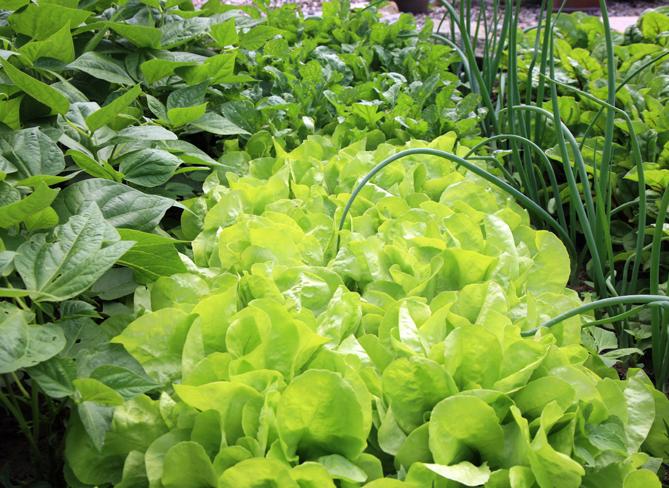
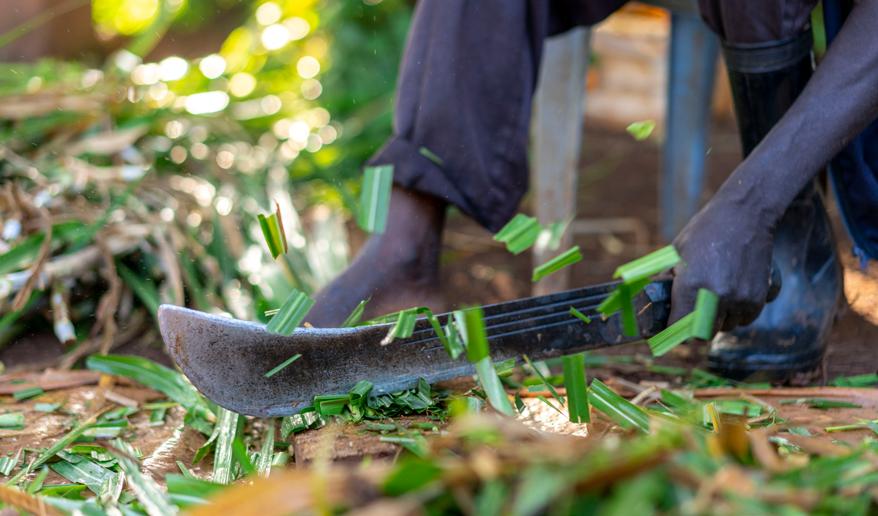

The proportion of people eating protein 2–3 times a week rose from 24% to





“The project introduced nutrition-dense foods like the Africa leafy vegetables, small livestock and dairy cows (milk) and other value chains. This has contributed directly to improved family nutrition and dietary diversification by the households.
Mary Moraa, Ministry of Agriculture Livestock, Livestock Officer, Angorom Ward
“The project has helped us to address crop and livestock production challenges through equipping us with knowledge on timely planting of crops, preservation of crop produce for livestock use… and maximum utilization of land by applying various farm system practices, thus increasing productivity.
Participants in a focus group discussion, Busibwabo
13
Staff interview: Promoting food security and nutrition from field to plate: Elizabeth
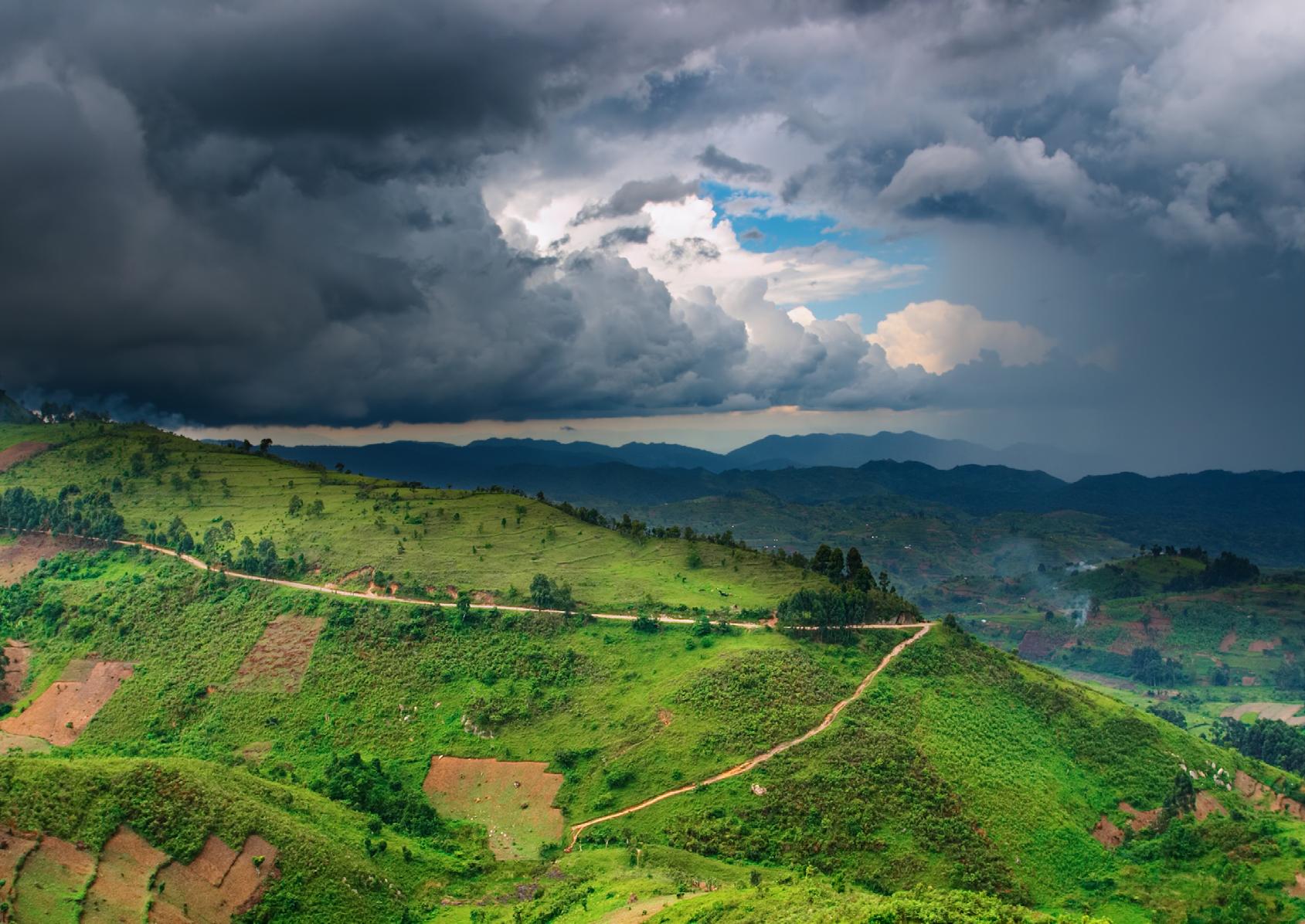 Odihambo, Ripple Effect’s Project Coordinator, Improving
Odihambo, Ripple Effect’s Project Coordinator, Improving
Nutrition
“Helping people improve their food security and nutrition is not easy in places where many people are not fully literate,” explains Elizabeth. “It is also made difficult by seasonal food shortages that are driven by changes in weather patterns and inefficient markets. These affect families’ ability to sustainably and nutritiously feed themselves.”
To tackle this multifaceted issue, through its partnership with the Ministry of Health, Ripple Effect created awareness about food and nutrition using simple messages and pictorial charts featuring graphics such as the “ideal plate”, composed of different food portions and colours to guide family meals. Group members pinned this on their walls as a reminder.
To ensure the food consumed was safe, cooking demonstrations were conducted for various age groups, demonstrating different methods of food preparation and preservation to maintain nutrients and avoid contamination. And our work goes far beyond what is grown in the field or placed on the table.
“To ensure that this work lasts and is built on, future projects should invest in women to help them increase the value of their
farm produce through access to credit, knowledge and land,” says Elizabeth. “In addition we need to help establish community marketing cooperatives and to market smallholder farmers’ agricultural produce. The ability to save and manage finances helps families survive even during lean periods. It has been proven that families that save are able to use their savings to improve on the agricultural production and overall family health.
“It’s so critical to support this work, because it is a cost-effective way to reduce mortality rates among children under 5 and create a healthier population, reduce vulnerability among smallholder families, reduce incidences of gender-based violence and ensure the long-term sustainability of food security.”
14
6. Income, enterprise and a growing culture of saving
Over the past three years many households in Western Kenya have dramatically improved their income as a result of our work to build sustainable livelihoods. For example, though daily incomes were perilously low at the start of the programme in Kakrao Ward, they had risen significantly from the equivalent of US$1.46 to US$3.98 by the end of the programme.
Almost all farming families reached by the programme in Kakrao are now much more confident that their sales of farm produce (such as poultry, bananas, vegetables, cereals, and fruits) can provide enough income to meet their needs. The good news is that during the threeyear programme, the percentage of households dependent on only one cash crop (tobacco) fell from 21% to just 6%, with almost all tobacco farmers (94%) reporting a desire to diversify their production to maximise income generating opportunities.
Average daily incomes have increased from
of families are now saving regularly of people are now satisfied with their income
HOUSEHOLD INCOME SOURCES –MORE VARIED AND SUSTAINABLE
In Busia and Bungoma, on-farm enterprises now contribute 67% of total household income among those reached by the Improving Nutrition programme, contributing an average of KSh 13,608 per enterprise (US$122). The proportion of households taking part in Ripple Effect’s nutrition support groups who had at least four income-generating enterprises rose from 6% to 83%.
Vegetable production was the main income-generating activity, followed
by the sale of live chickens, cereal production, and milk production. Eggs were the main product for 37% of households, fruit was the main product for 33%, while the sale of cows was a source of income for 31%. Encouragingly, the proportion of households generating an income from vegetables rose from 9% to 73%, while poultry sales increased from 11% to 66%. There was also a significant increase among those earning money from milk sales, up from 2% to 39%. Overall, the average income per day among households reached was US$3.01 compared to US$ 0.43 per day at the start of our programme.








Importantly, 88% of households reached are now satisfied with their income, compared to 59% before the programme. The end result is a large local economy generated by the farmers themselves – a hallmark of our community-led approach.
IMPROVING THE CULTURE OF SAVING
Ripple Effect encourages the establishment of Village Savings and Loan Associations, which have been a popular way for families to access credit. Families can borrow KSh 9,467 (US$85) at any one point for investment in on- and off-farm activities such as eateries and motorbike transport businesses. A rise in disposable income in Busia and Bungoma Counties was reflected in a rise in saving – an astonishing 98% of households reached by the programme are now regularly saving and weekly savings have increased to an average of US$8.8, compared to US$1.3 before the programme.
Play a short video summary of this chapter


Play mini podcast ‘Savings and Shocks’


15
7. Access to health care and health insurance
Ripple Effect’s


over the past three years. In Kakrao Ward, for example, communities such as Nyabisawa and Otacho report access to health services as “moderately” to “much improved”.
Thanks to our work around income generation and saving, many more people (up to 90% of nutrition support group members in some communities) now have the financial means to access health services.
“The greatest success in fighting HIV and AIDS in this ward has been reduction in stigma, the achievement of viral suppression by over 95%, and antiretroviral drug adherence. Clients are being linked to health facilities and support groups are being created, through which members can exchange experiences.
Community Health Volunteers
of people report that access to health services has improved of people are registered for health insurance, up from 24%
of households reached who are in need of HIV/AIDS services
And there’s more good news. Since our programme work began in Busia and Bungoma three years ago, 85% of nutrition support group members have registered with a community health insurance scheme. In addition, 96% of households have adopted at least five primary health care practices thanks to the awareness raising work conducted by our Community Health Volunteers. These practices include hand washing, using toilets and safe water sources, drying dishes on a rack, and correctly using mosquito nets.
MATERNAL AND CHILD HEALTH HAS IMPROVED
In Busia and Bungoma, the number of mothers exclusively breastfeeding their new-borns has risen from 67% to 89%. This, alongside learning to safely prepare quality food through cooking demonstrations, has reduced stunting prevalence among under-fives. At the time of our end of programme survey, 87% of
mothers had good nutritional status compared to just 32% before the programme began.
HIV AND AIDS SUPPORT IS WIDESPREAD




Overall, 97% of households in Kakrao have been tested for HIV and AIDS – an initiative that has improved detection of positive cases, empowering people to better manage their own health and wellbeing and avoid spreading the virus to others. 85% of direct beneficiary households have been able to access HIV and AIDS care, including access to anti-retroviral medicine, referral to support services, assistance with status disclosure and access to nutrition support.
THE IMPACT OF COVID-19
Ripple Effect Kenya reacted quickly to the outbreak of the pandemic, adapting programme activities to focus on awareness raising, hygiene and sanitation and income
generation. Community Health Volunteers and Peer Farmer
Trainers shared advice through radio broadcasts and handwashing stations and information boards were erected at all the water points rehabilitated through the programme. Many groups learnt how to make liquid soap and began selling it to their communities at an affordable price: in Busia and Bungoma ten groups produced more than 6,700 litres of soap, earning Ksh 770,000 (US$ 6955.7), which they invested back into their own development projects.
Play a short video summary of this chapter
16
Access to primary health care has improved as a result of
work
Case study: From farm gate to better future: Miriam’s story
Miriam, 62, lives with her husband and five grandchildren on her 0.5-acre farm in Migori, Western Kenya. She is a member of Khanyanje Women’s Group, which supports members to grow bananas and vegetables, rear poultry, plant orchards and organise group savings and loans.
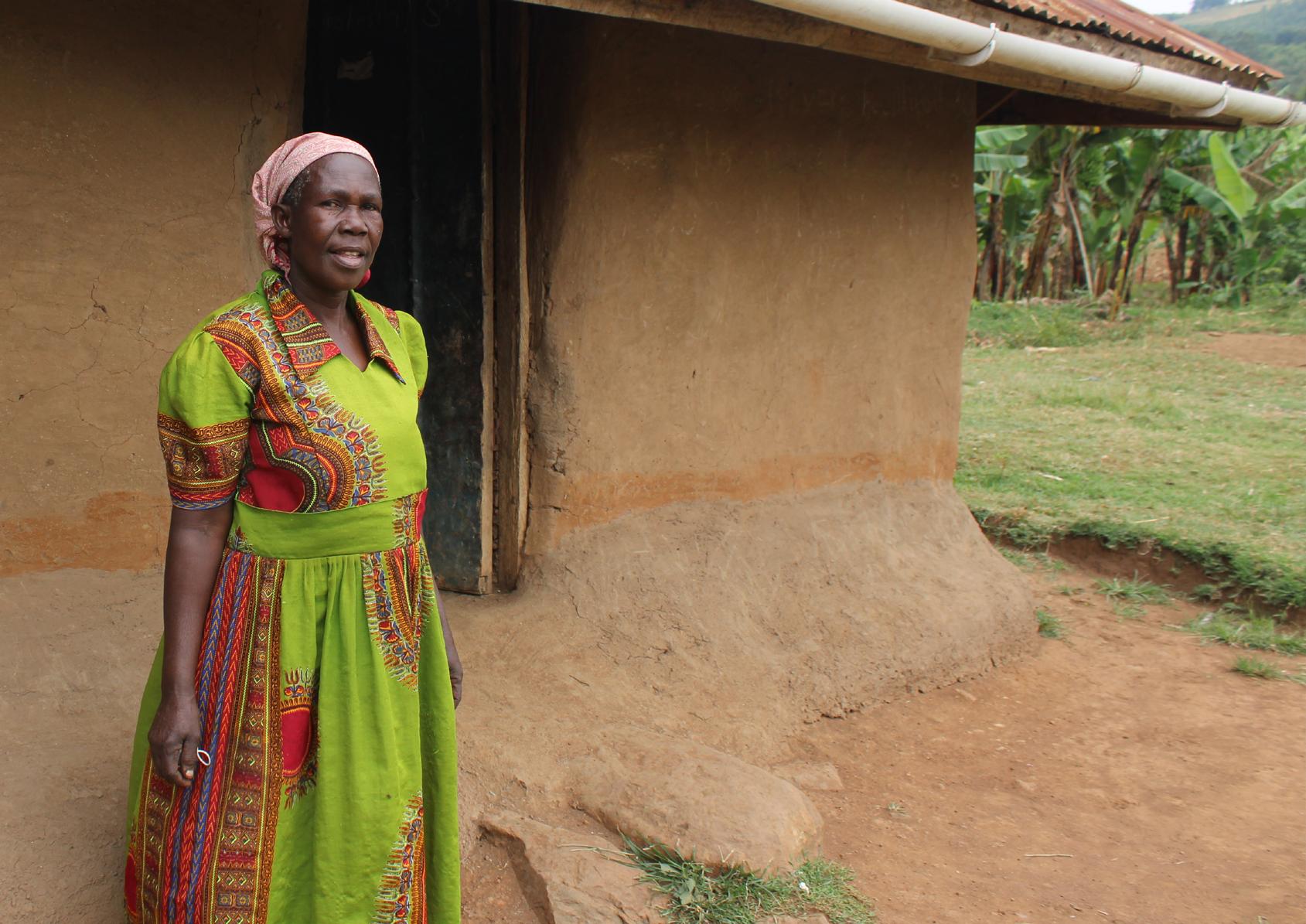
Before she became involved with Ripple Effect, Miriam and her husband worked on other people’s farms to get food for their orphaned grandchildren. “On many occasions my grandchildren would wake up, put on their uniforms and run to school without eating anything, with hope that when they came back in the afternoon they would find something to eat,” recalls Miriam.
Miriam and her husband did not believe they could grow crops because they lacked knowledge and skills. But their yields were low because of depleted soil fertility, so Ripple Effect trained them to properly prepare the ground for cultivation (mulching, weeding, thinning and applying compost manure to improve soil fertility) and provided 10 improved variety banana plantlets.
Today Miriam grows maize, bananas, pawpaw, cassava, potatoes, beans and hot pepper and sells to a company that collects the produce at the farm gate. She employs one person three days a week on the farm, and during the planting and weeding season she employs three to five others. “Most of our income
is from bananas and we want to plant more. We have bought two cows and we are hopeful they will give us milk to consume at home and to sell. I am happy I no longer work on other people’s farms, instead I am an employer.”
Today, her grandchildren are rarely ill, and she comfortably pays their school fees. “It makes me happy [sending] them to school since I was not able to take their parents to school. My grandchildren are also very healthy, and whenever they fall sick, I can afford the health care expenses at the local health centre.”
17
Continued overleaf
continued...
These improvements are the result of painstaking work to transform traditional farming and gender roles. Ripple Effect takes families through a process of “envisioning” to set visions for their future. Additionally, Ripple Effect organises exposure exchange learning visits, where farmers visit other farmers for inspiration and to learn what they have achieved.
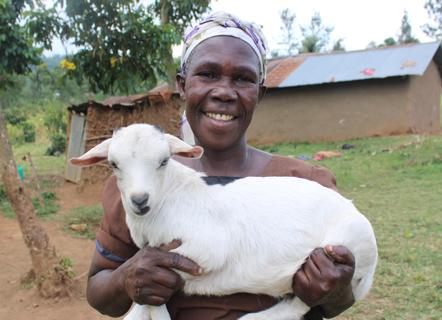
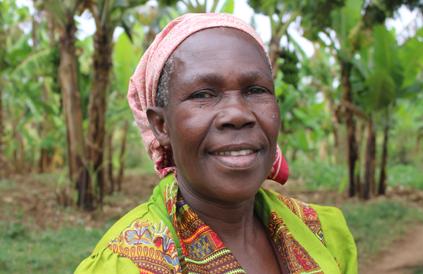
“My husband never used to do farm work because it was mainly for food consumed in the household, and he felt it was my responsibility to provide food for the family. One day he visited his friend Robert, a member of another Ripple Effect supported self-help group, and found him working on their farm
with his wife Dorcas. Robert shared with him the benefit of working together as a family – especially on establishing a banana farm. When he came back he started digging banana holes. Since then he attends Ripple Effect trainings.”
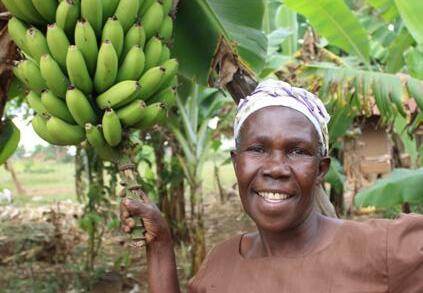
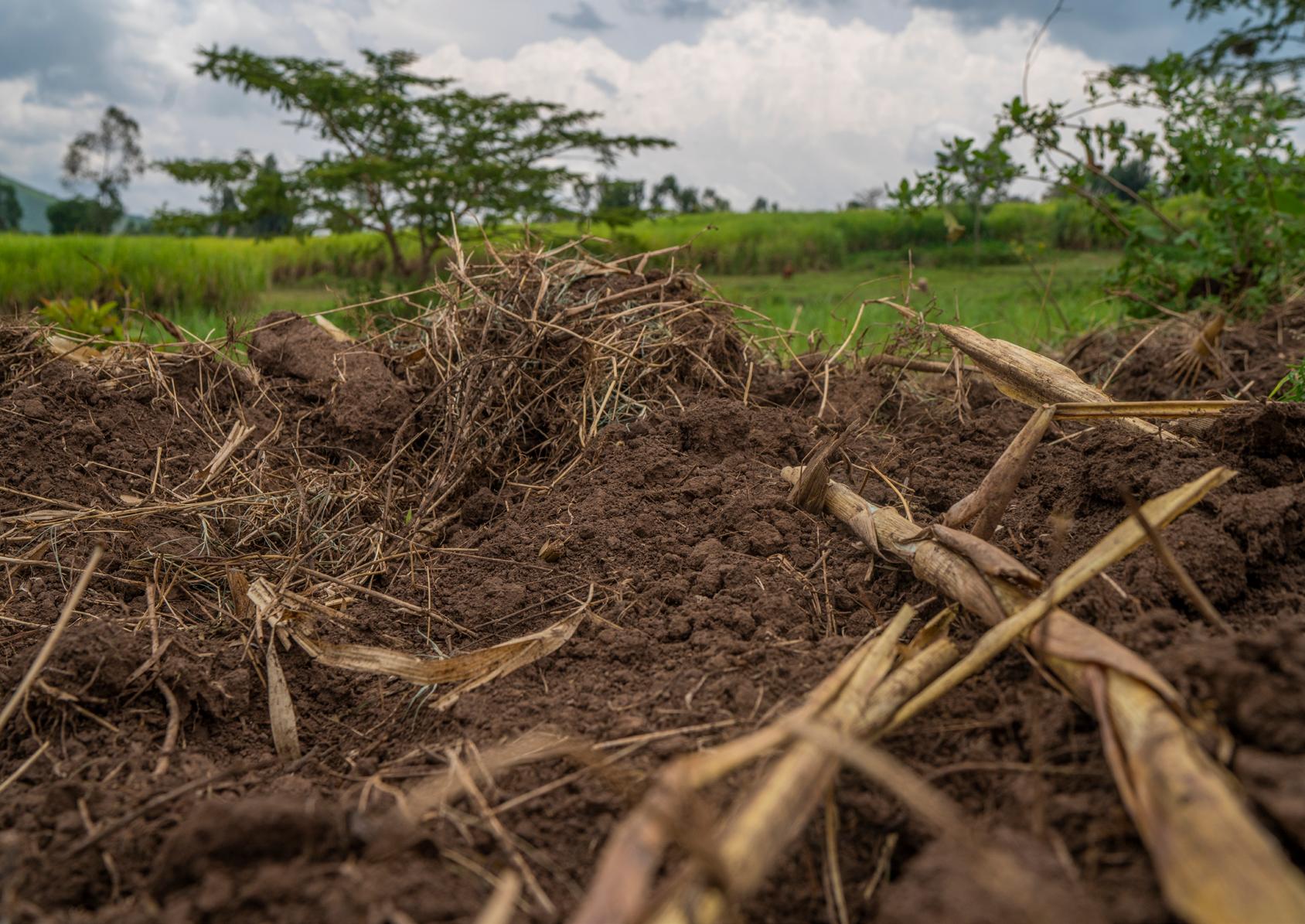
“The little money my husband was getting from casual labour was never used in our home, but after the training he started sharing his income with me and even asked my opinion on how the money should be spent. Because of the openness on our income, we have been able to buy cows and are now even paying for an extra piece of land. We now save our money together.”
“I am so grateful to Ripple Effect
for coming into our lives. You may never know how much you have changed our lives and joy you have brought us. I may not be able to pay you back in return, but just thank you and pray that you continue doing for others what you have done for us.”
18
Case study: From farm gate to better future: Miriam Minayo’s story
“
These improvements are the result of painstaking work to help farmers like Miriam change their mindsets about farming and gender roles.
8. Safe water and improved sanitation
Safely sourced and treated drinking water and access to hygienic toilets are critical for good health. Ripple Effect’s work in communities in Western Kenya has led to up to 93% of households now accessing safe water in under 15 minutes, through the rehabilitation and protection of local springs and training on rainwater harvesting (rainwater being the major source of drinking water for many households).
HOUSEHOLD ACCESS TO SAFE WATER
The proportion of households accessing water from safe sources in Busia and Bungoma Counties increased to 93% as a result of our work. And through awareness raising, the number of households treating their drinking water increased hugely to 95% – the result of locating chlorine-dispensing points next to water collection points, as well as training families on improved practices such as filtering and boiling the water for improved quality.
of households can now access safe water within 15 minutes of households now treating their drinking water of households have improved toilet designs
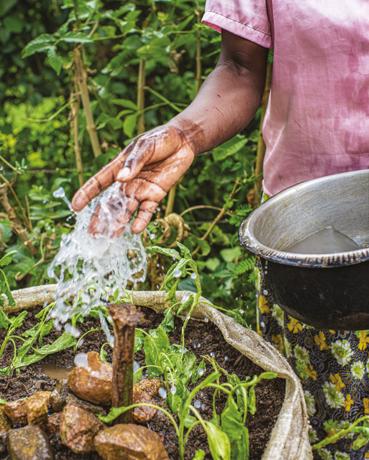
IMPROVED TOILET ACCESS
Our work also saw the proportion of households without toilet facilities, and therefore practising open defecation, fall to just 0.5%. This significant reduction was associated with campaigns and community sensitisation and training on improved sanitation. The proportion of households with hygienic toilets increased from 35% to 67%, with key improvements including the use of slabs over pit latrines and the introduction of ventilation pipes. Some households installed flush toilets connected to sewers, a more expensive option, suggesting that improved incomes are being used to improve toilet facilities.
Play a short video summary of this chapter





Play mini podcast ‘Safe Water and Covid 19’

19
“
More people prefer to use our water point because it is protected. Water from the unprotected water wells are visibly dirty and are not safe for home use. We also have fewer cases of waterborne and skin diseases. All this is attributed to the use of safe water from SILOBA well.
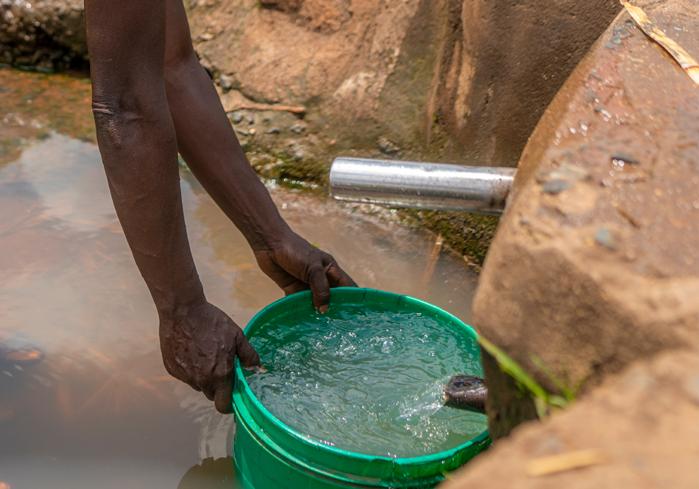
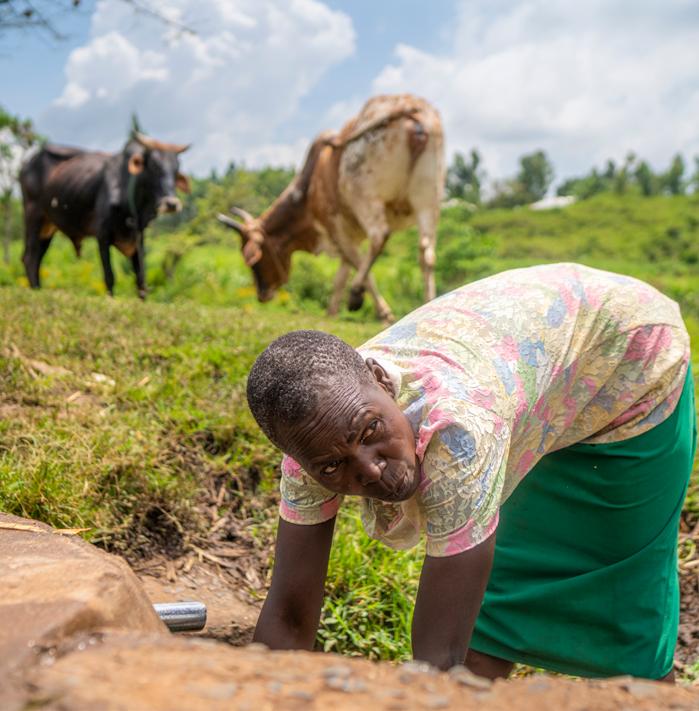
Chair, Siloba Water Users’ Association
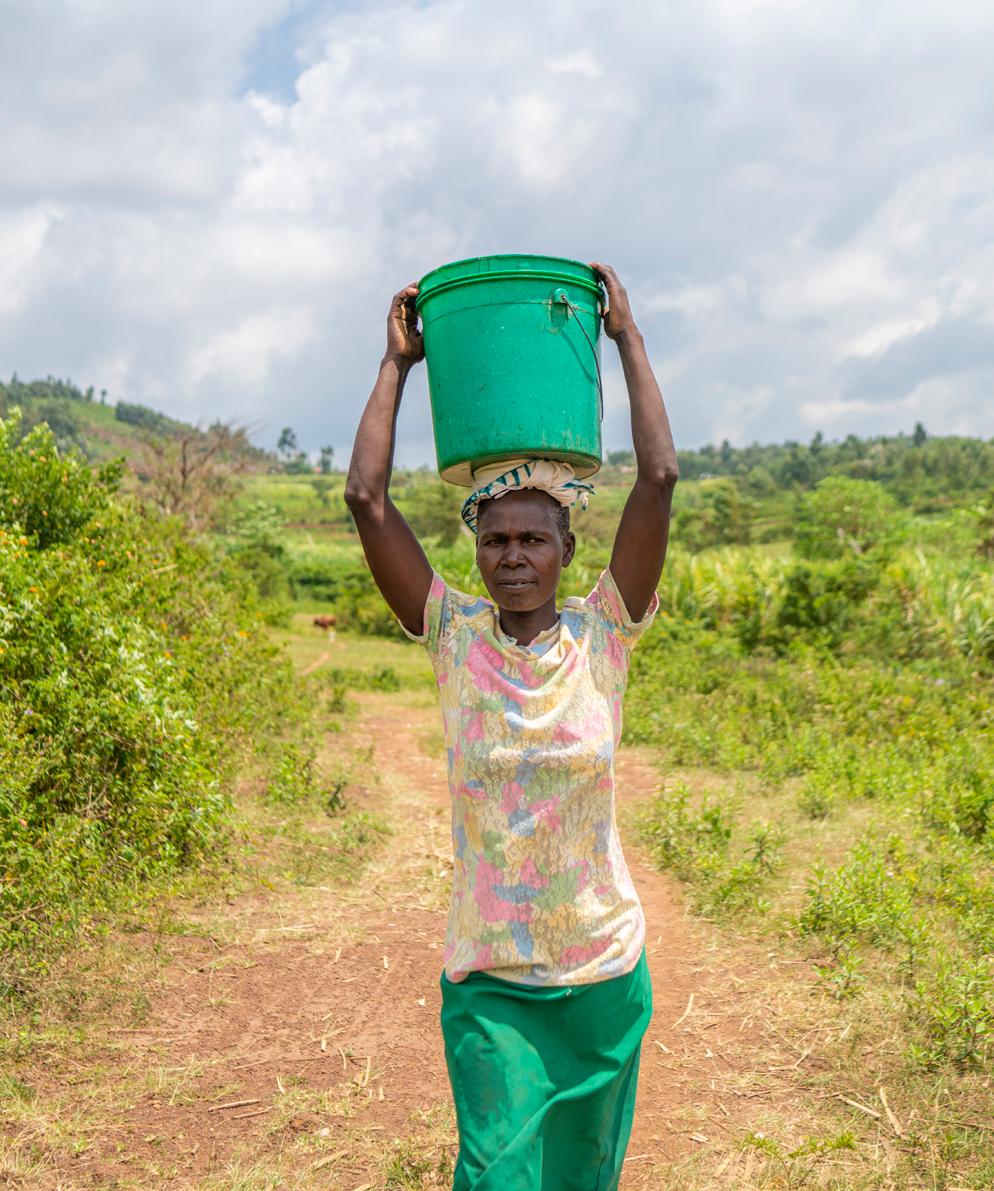 Grace Kadaogo, a farmer working with Ripple Effect in Busia Country, Kenya
Grace Kadaogo, a farmer working with Ripple Effect in Busia Country, Kenya
9. Strengthening economic, social and climate resilience
Over the past three years, Ripple Effect’s Peer Farmer networks and Community Health Volunteers have worked alongside farming communities in Western Kenya to build social, economic and environmental resilience in the face of huge challenges such as COVID-19 and climate change. Whether it is through improved nutrition, health care, income or natural resources, communities are stronger, more confident and more resilient than before the programme started.
PEOPLE HAVE THE PHYSICAL AND EMOTIONAL STRENGTH TO FACE UNEXPECTED CHALLENGES
Through improving their food security, nutrition and health, families that have worked with Ripple Effect in Western Kenya have built the physical strength they need to overcome any challenges they may face. By working through harmful attitudes and behaviours related to gender, disability and HIV & AIDS, and working together in inclusive family units and support groups, smallholder farmers have also broken down barriers and developed strong emotional and practical support networks. Despite climate shocks and the emergence of the COVID-19 pandemic during the programme period, our smallholder farmers demonstrated high levels of resilience – in Busia and Bungoma 96% say they are now happy with their lives and 99% are optimistic about the future.
and enterprises are thriving, many farmers are fully employed on their own land. As a result, incomes have risen - in Kakrao, daily income has increased from US$1.47 to US$3.98, which has enabled savings to be made. On average, families in Busia and Bungoma are saving $2.25 a day, which creates a financial safety net and will allow for investment in other small businesses.
THE ENVIRONMENT IS BETTER ABLE TO WITHSTAND CLIMATERELATED SHOCKS AND STRESSES
Smallholder farmers in Western Kenya have adopted a wide range of practices to mitigate the impacts of climate change and improve environmental management.
They are harvesting rainwater and using simple irrigation systems and drought tolerant crop varieties to continue growing even during dry spells. They are diversifying crops and planting trees and grasses to enrich and stabilise depleted soils, as well as to protect their land against floods. They are using environmentally beneficial methods to cope with pest invasions and attract pollinators. As a result, ecosystems in Migori, Busia and Bungoma are once again beginning to thrive and provide food, water, shelter and income generating opportunities for the communities they support.
Play a short video summary of this chapter
Play the podcast ‘Social and Economic Resilience’
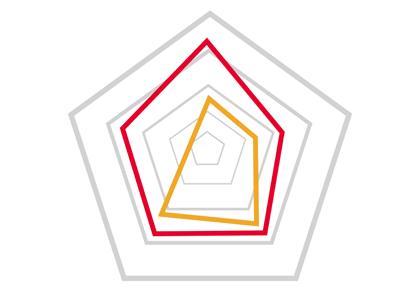
INCREASED INCOME AND SAVINGS PROVIDE A FINANCIAL SAFETY NET
Our work in Western Kenya has supported farming families to build economic resilience by diversifying agricultural production so they have a range of items to sell and developing non-farm related enterprises to spread economic risk in case of shocks that might affect production. Now that their farms
Kakrao Better Life Index
Hope and Satisfaction Index 0% 20% 40% 60% 80% 100%
Nutrition Security Index Social Inclusion Index Hygiene and Sanitation Index
Financial Security Index
21
NOV 17 BASELINE JUL 20 / YEAR 3
Looking ahead: conclusion
Over the past three years our work has helped dramatically improve people’s nutrition, financial security, social inclusion and sense of hope and satisfaction in many communities. Through networks of Peer Farmer Trainers and Community Health Volunteers, we have directly trained over 13,280 farmers (who support over 53,000 other people), and even more indirectly, through improved agriculture, natural resource management techniques, and access to safe water.
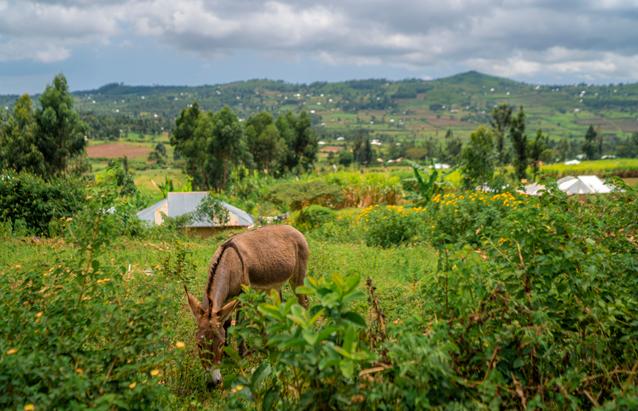
Women have experienced positive change in their lives – more have a say in important decisions and there is significantly less incidence of domestic violence. We have levelled up on gender equality by empowering women, working to eradicate attitudes that fuel violence against women and girls and tackling HIV and AIDS and the stigma that surrounds it. We’ve also increased incomes and generated new sources of livelihoods – all by supporting people to improve their skills and believe in their power to change their lives. Sources of income are more diverse, helping people earn more, save and invest to feel more secure. Nutrition has also improved and the food consumed is of a better quality, more varied and more readily available.
Overall, communities’ economic and social resilience has grown and whether it is through improved incomes, nutrition, health care or more equal gender relations, communities are stronger, more confident and more resilient than before the programme started. After only three years, our work has demonstrated high social and economic return on investment, the value of which will accumulate as families, communities and environments continue to thrive in the coming years. We are committed to continue supporting more vulnerable families to free themselves from poverty, ill health, harmful practices, gender inequity and violence and to mitigate the effects of climate change sustainably.
Alfred Juma Programme Manager
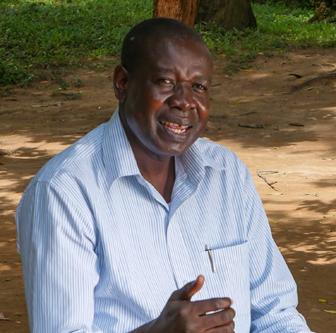
22
“
...communities are stronger, more confident and more resilient than before the programme started.
Alfred Juma
Case study: “Develop, arise, and plan for a good life.”
Caroline’s story
“ My life before Ripple Effect?
I’m sure that if I had not partnered with Send A Cow, I could have lost other children, because my youngest child died of malnutrition.
Caroline and her husband Simon Omugogo, from Alupe, Western Kenya, had five children but tragically one died of malnutrition. At the time they were not farming their land because they lacked the skills to prepare it for cultivation.
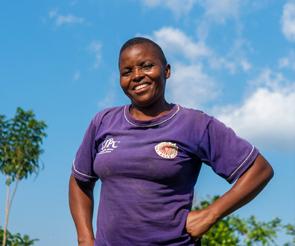
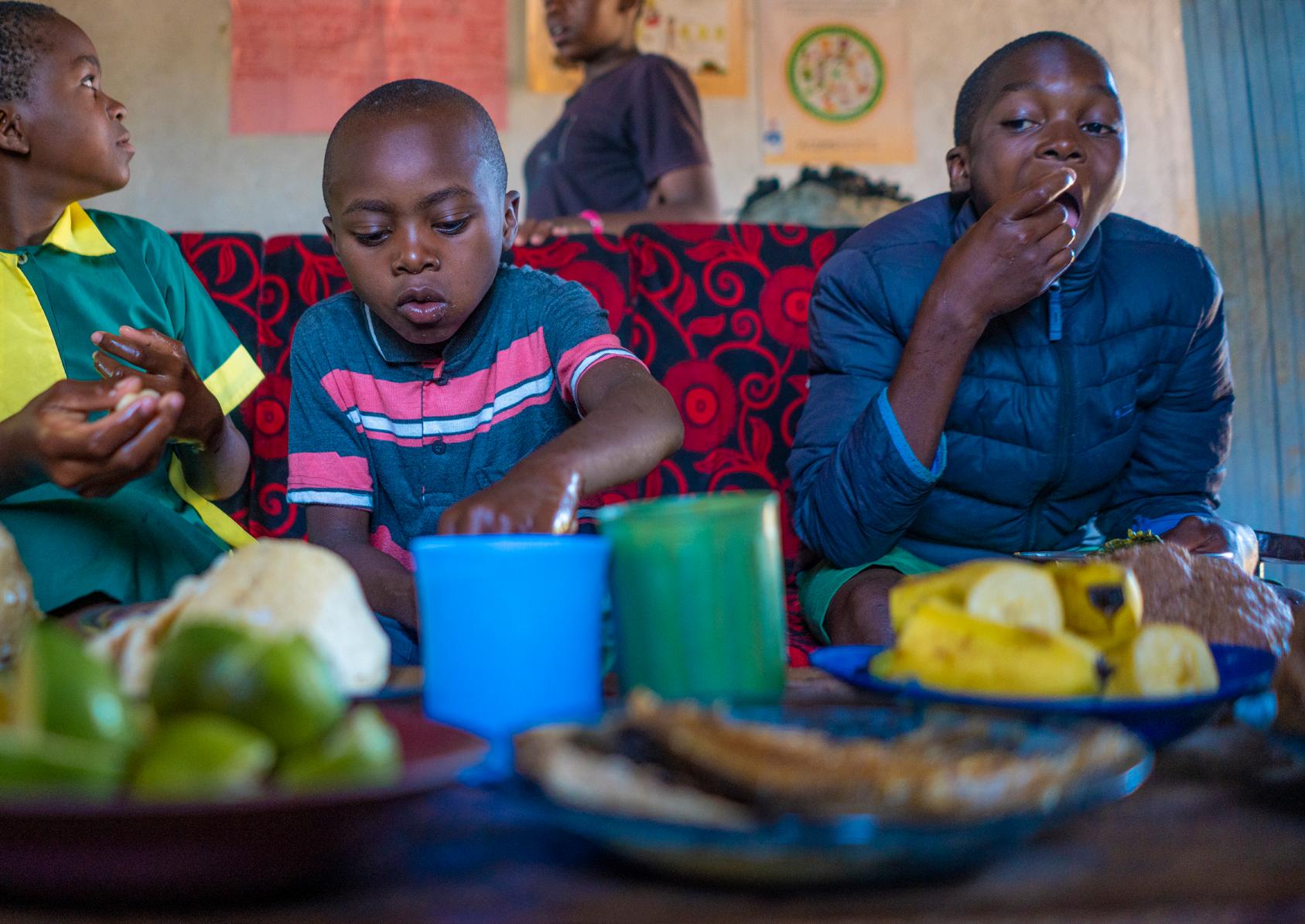
“I would wake up and roam around the village, begging and gossiping, sometimes farming
for people,” recalls Caroline. “When I partnered with Ripple Effect I changed and started farming… they trained me on how to prepare my farm and plant crops such as bananas, cassava, sweet potatoes, pumpkin, bananas and vegetables, which you can sell and eat.” Caroline says her happiness today stems partly from the improvements in income and food security that Ripple Effect has supported her to generate, and partly from not being reliant on others to feed her family. “I plan my life”, she says simply. “I now know I can earn money from the farm. If I had partnered with Ripple Effect earlier, I would not have wasted 15 years of my life!”
IMPROVING GENDER ROLES
There’s also a new gender balance in the home. “Initially [Simon] used to let me do things alone – he would let me go to the neighbours to borrow food. Now, my children and husband all contribute – my husband cooks… we farm together, and since joining Ripple Effect, our relationship has improved. We discuss issues with the children, everyone plays their part. Working with Ripple Effect made me love and accept myself, recognize where I am at, and do what I can to improve my living standards.”
Continued overleaf
23
Case study: “Develop, arise, and plan for a good life.” Caroline’s story continued...
SHARING THE KNOWLEDGE, PASSING IT ON
“The skills and training first and foremost transformed me and my family and that made me influence other women,” she explains, describing how her former friends have started to become more active following her example. “The changes in my life have made them desire to learn the technologies, and that’s how I started training them.” Now she teaches other women to plant a keyhole garden, produce and use organic mulch and compost, intercrop vegetables and bananas and practice crop rotation, proper animal housing and water conservation.
“I train and mentor two groups with 25 members who are now selfreliant because of trainings that I have given them. The members have implemented various technologies from which they produce their own food and this has led to increased savings. Our vision was to change our lives; our mission was to promote unity amongst us. Our group is strong,” says Caroline.
ADAPTING TO CLIMATE CHANGE
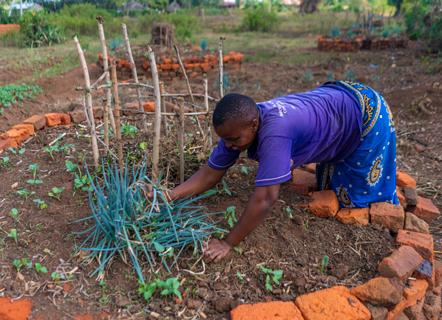
“I was not able to prepare my land early because the rains delayed. The drought made me realize the importance of having our own water source, and that is why I decided to invest in my own water well. Changes in the weather have also made me not rely on one type of food, even for vegetables. Initially, I used to plant only maize and beans, and when affected by weather changes we used to go hungry for a long time. [But now] I plant different crops for a rainy season and some during drought.”
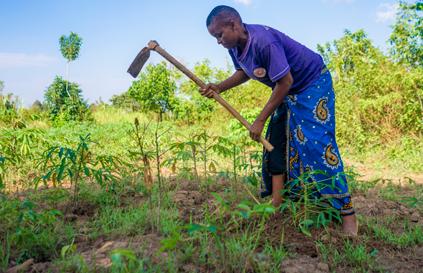

EDUCATION AND HEALTH
“If Ripple Effect left now or tomorrow, I have the knowledge. My hope is that my children and my life will be good … and my income will increase. Because I am getting money, it’s my goal that my children study up to university.” Ripple Effect also encouraged Caroline and her family to access health insurance as security in the event of falling sick. She however says it has been a long time since she was sick, something to which she attributes the improved nutrition and better living standards. Now she says: “The only thing that can prevent me from farming is death. If I fall sick, I will hire labour or be supported by my children to ensure that I continue farming. I am training my children to be farmers despite their education so that they can be self-employed, food and nutrition secure and earn incomes from the farm.”
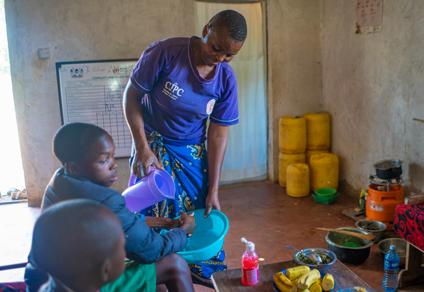
“
24
If Ripple Effect left now or tomorrow, I have the knowledge.
Stanbic Bank is a member of Standard Bank, Africa’s leading bank, committed to driving the continent’s growth and now proud to partner with Send a Cow.

Since 2016 the Standard Bank Group has supported Send a Cow’s community led programmes which successfully impart sustainable farming practices, that support nature and deliver immediate protection against climate shocks, to families and communities living in vulnerable and marginalised areas where climate change is having a devastating impact.
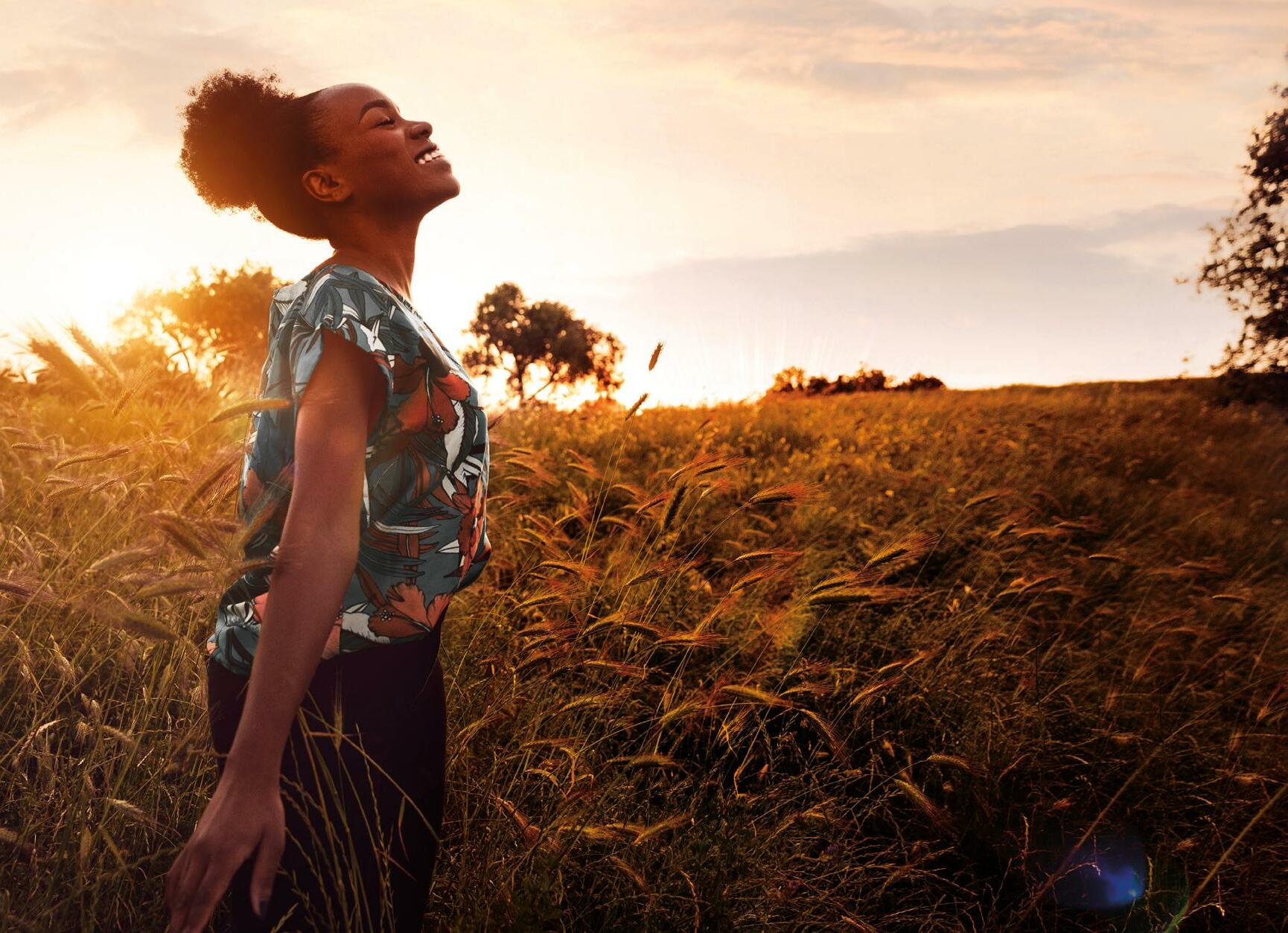
In 2020 the Standard Bank Group also supported Send a Cow’s emergency response to COVID-19, focusing on safe community engagement and intensified awareness, heightened training in hygiene and sanitation measures, and emergency provision of seeds. We look forward to continuing our sponsorship of Send a Cow projects and the positive impact they create.
Find out more about the impact report sponsors www.standardbank.com/international and www.stanbicbank.co.ke/kenya/personal/about-us/ stanbic-kenya-foundation
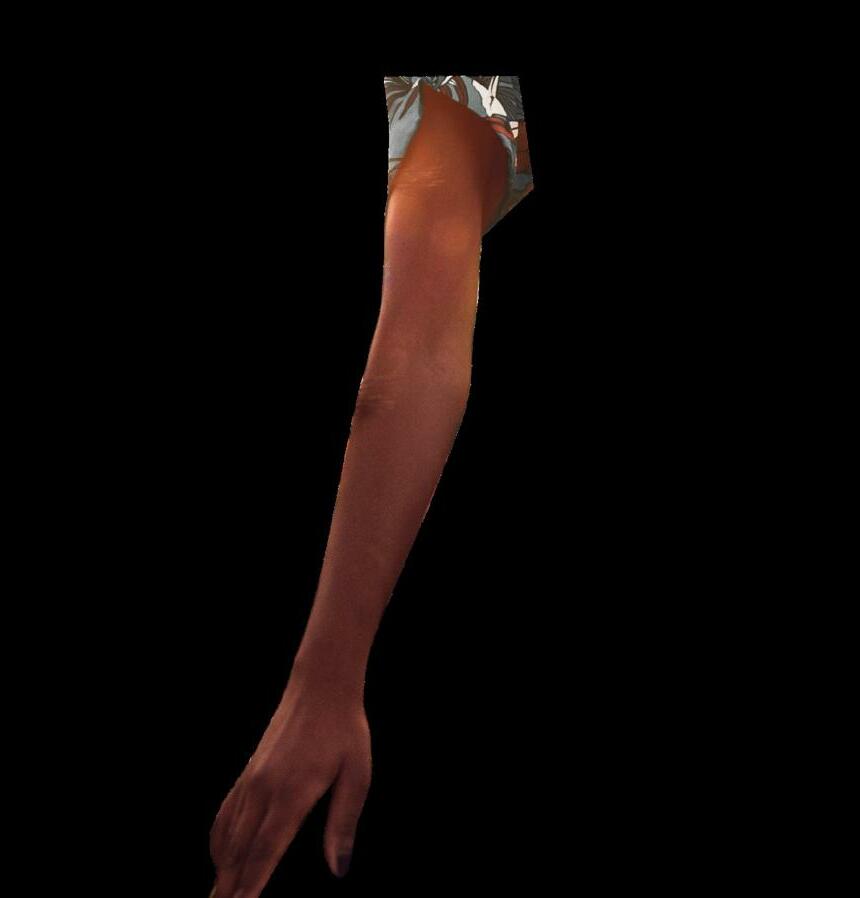 Stanbic Bank Kenya Limited is licensed and regulated by the Central Bank of Kenya
Stanbic Bank Kenya Limited is licensed and regulated by the Central Bank of Kenya
Written by Angela Burton
Thanks to all those involved in the Improving Nutrition and Kakrao Sustainable Livelihoods projects: farmers, staff, supporters and funders
Photographers: Fredrik Lerneryd and Send a Cow staff Front cover photo shows Caroline, by Fredrik Lerneryd Thank you to Stanbic Bank for sponsoring this publication © Send a Cow 2021
UK Ripple Effect, The Old Estate Yard Newton St Loe, Bath BA2 9BR +44 1225 874222 info@sendacow.org Kenya
Ripple Effect Kenya, Kefinco Estate Hse 2. Box 1761 – 50100, Kakamega, Kenya

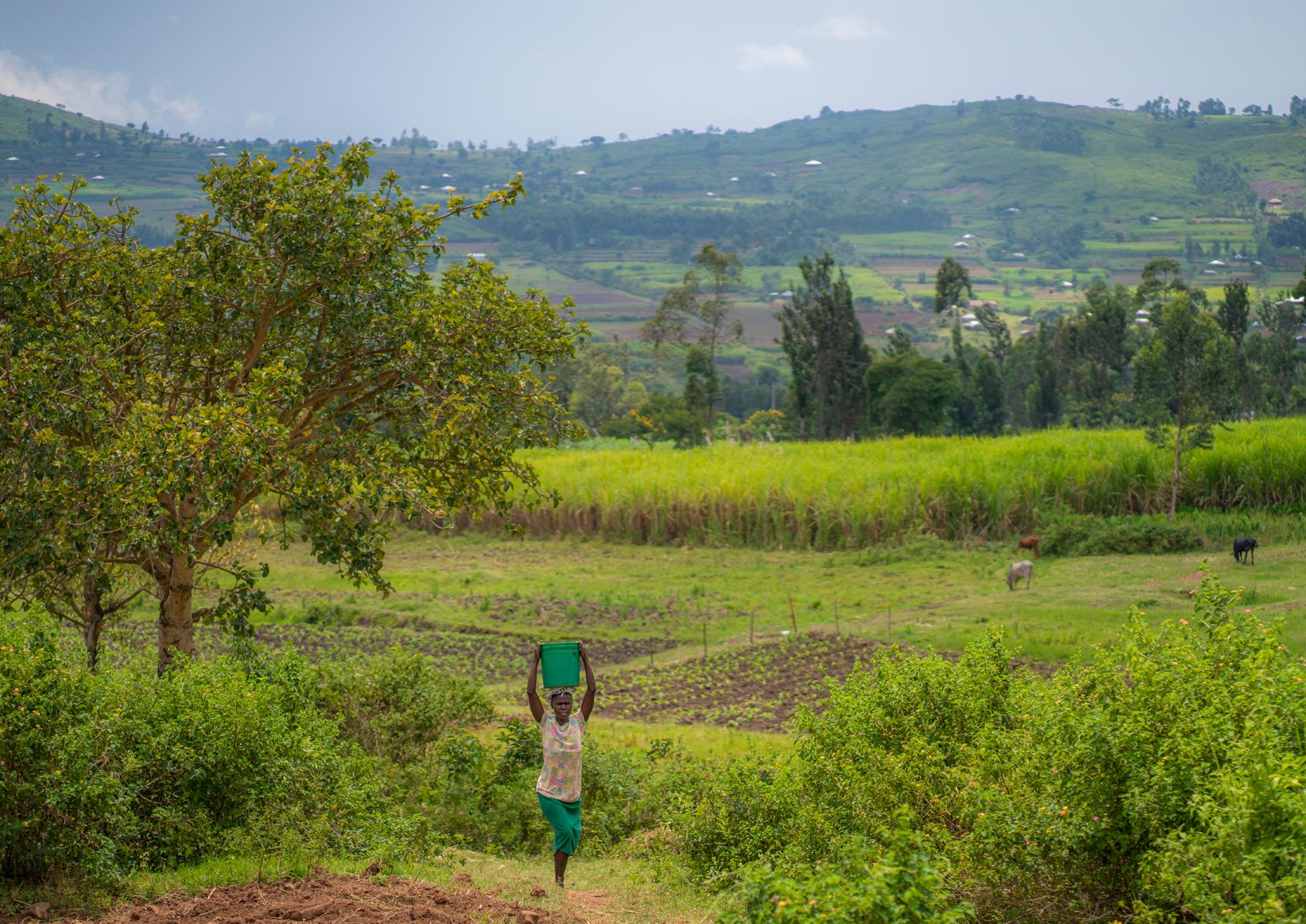
President HRH, The Prince of Wales
Patrons Baroness Lynda Chalker of Wallasey Rosemary Conley CBE Jonathan Dimbleby Nick Park CBE Guy Singh-Watson David Suchet CBE Toby Buckland Rt Revd Ruth Worsley
Trustees Fiona Crisp Stephanie Dennison Simon Doherty John Geake, Chairman Andrew Gillam Peter Hinton Dr Andrew Magoola Isabella Wemyss Alison Griffith Chief Executive Paul Stuart
sendacow.org Reg charity number 299717



 Titus Sagala Country Director
Titus Sagala Country Director























 Odihambo, Ripple Effect’s Project Coordinator, Improving
Odihambo, Ripple Effect’s Project Coordinator, Improving













 Grace Kadaogo, a farmer working with Ripple Effect in Busia Country, Kenya
Grace Kadaogo, a farmer working with Ripple Effect in Busia Country, Kenya











 Stanbic Bank Kenya Limited is licensed and regulated by the Central Bank of Kenya
Stanbic Bank Kenya Limited is licensed and regulated by the Central Bank of Kenya

